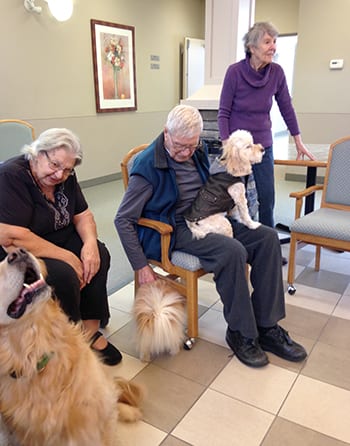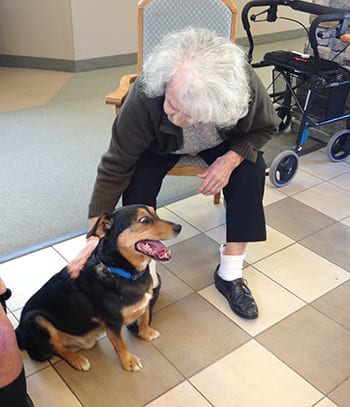They might not interact much with anyone, anymore. They might not remember the names of their spouses or closest relatives. But when they pet a happy dog, or when a kitten is placed in their lap, the change in the seniors – many of whom have dementia, Alzheimer’s and other ailments – is truly, something special.
 “The Cranbrook BC SPCA has been bringing joy to the seniors of our local community through spreading the love of animals,” says BC SPCA East Kootenay Branch manager Brenna Baker, noting how she and staff member Dusty Cleland take their BC SPCA-adopted dogs to Joseph Creek Care home to visit residents, and Pines Care Home in Kimberley also visit the shelter with a bus full of senior residents, usually about once a week.
“The Cranbrook BC SPCA has been bringing joy to the seniors of our local community through spreading the love of animals,” says BC SPCA East Kootenay Branch manager Brenna Baker, noting how she and staff member Dusty Cleland take their BC SPCA-adopted dogs to Joseph Creek Care home to visit residents, and Pines Care Home in Kimberley also visit the shelter with a bus full of senior residents, usually about once a week.
“To see their reactions is priceless. We know that animals can be therapeutic, but to see it in action is amazing – one time, we were visiting a resident who never spoke or showed any form of emotion whatsoever, but when Hunter and Boomer (a border collie and Pomeranian) showed up, her eyes lit up and she started making sounds! It brought tears to the care worker’s eyes, as she said she had never seen this before and what amazing progress it was.”
Cleland’s dogs, as well as Baker’s own Moocho, a golden retriever, are popular in the care facility visits and on the bus – and sometimes, they’ll bring kittens onto the bus for the facility’s residents to cuddle, Baker notes.
Often, the sight of the animals and petting them will trigger memories in residents whose memories don’t work as well as they used to, and they’ll start telling stories of childhood pets they had, and they’ll remember the names of their beloved pets and the love they had for them, Baker says.
 “Our dogs are amazing and seem to know that they’re there to do a job – they seem to sense if someone is sad or lonely, and that’s the person they’ll go to. It’s almost magical,” she says. “One man couldn’t say anything and couldn’t move, but when Moocho went over and put his nose right under his arm, his eyes lit right up! Their recreational therapists are constantly amazed at the change animals bring in some of the residents.”
“Our dogs are amazing and seem to know that they’re there to do a job – they seem to sense if someone is sad or lonely, and that’s the person they’ll go to. It’s almost magical,” she says. “One man couldn’t say anything and couldn’t move, but when Moocho went over and put his nose right under his arm, his eyes lit right up! Their recreational therapists are constantly amazed at the change animals bring in some of the residents.”
Baker is hoping to develop the program into something much larger, and plans to apply for funding to hopefully, run a pilot program as early as next spring. Volunteers for such an endeavour are always welcome as well, she notes.
“I really believe that animals are so important to the well-being of seniors,” Baker says. “They can’t have pets in the facilities they’re in, but their reactions speak so much louder than words, and make it so worthwhile.”
The British Columbia Society for the Prevention of Cruelty to Animals is a not-for-profit organization reliant on public donations. Our mission is to protect and enhance the quality of life for domestic, farm and wild animals in B.C.
